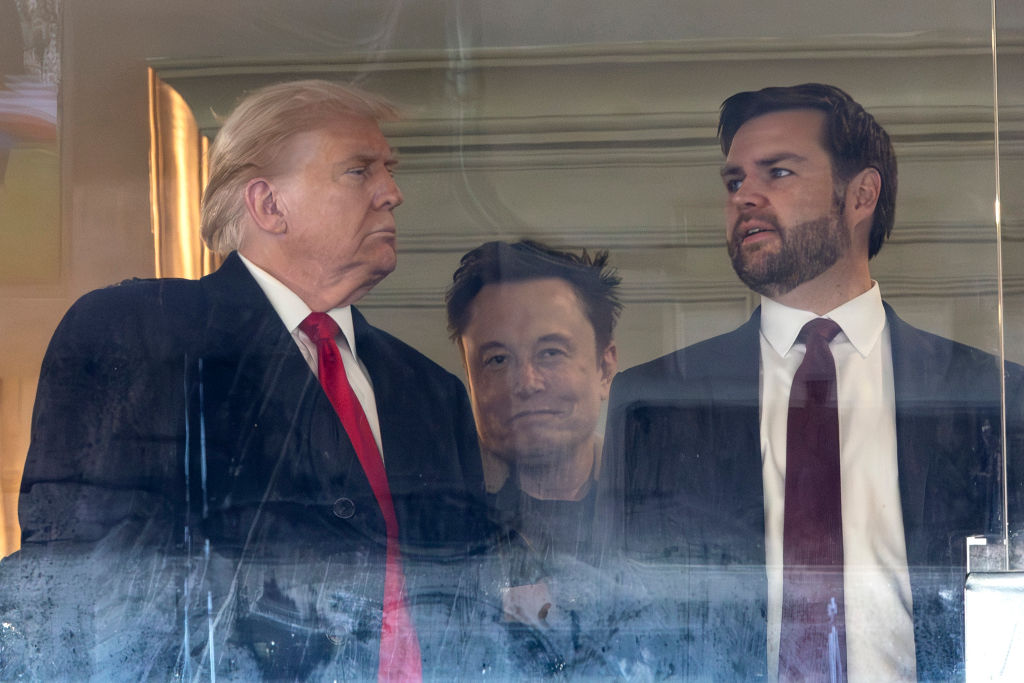At one point in the 2009 art house horror film Antichrist, Willem Dafoe’s character is walking in the woods and stumbles across a fox eating its own entrails. As a shocked Dafoe stares at this vulpine ouroboros, the fox looks up at him and proclaims in a haunting, otherworldly voice: “Chaos reigns.”
This gruesome, disturbing image is an apt way to think about the last several days on Capitol Hill—and a good preview for how the next four years under Donald Trump might go in Washington. Be prepared for last-minute reversals, unclear directives for executive branch officials and legislative allies, and a cavalcade of official and unofficial advisers such as Elon Musk whispering, Rasputin-like, in the president’s ear. Trump may be the commander in chief, but chaos will reign.
To illustrate, we can recap the drama that ended early on Saturday morning, when the Senate approved a stopgap spending measure passed by the House of Representatives a few hours before. Getting there meant taking a circuitous route that left the president-elect looking slightly diminished politically on the cusp of his second term.
All of this began thanks to a deal to continue funding the government brokered by the Republican House speaker, Mike Johnson, and Sen. Chuck Schumer, the Democratic majority leader. The agreement would have funded Democratic priorities, earmarked $100 billion in disaster relief (including money meant largely for Republican areas affected by hurricanes Helene and Milton), and kept the government open through mid-March.
Johnson, who had attended the previous weekend’s Army-Navy football game in the president-elect’s box, claimed that Trump had been fully read-in on this plan. The spending package would allow this Congress to end its session with the government funded. Johnson could start afresh with a new Republican Congress in January, when he and the new Senate majority leader, Sen. John Thune, would work hand-in-glove with the Trump White House on a shared legislative agenda. Yes, the plan would (and did) enrage some of the House’s most vocal fiscal hawks, but with the finish line for both the Democratic Senate and Biden administration in sight, from Johnson’s perspective, the deal was tenable.
More from Mike Warren
Robert F. Kennedy’s views on health may have more popular support than we think.
The response from some Democrats to the killing of Brian Thompson is part of a bigger problem.
Last Tuesday night, the legislative language was made public, and on Wednesday morning, all hell broke loose. Musk, the South Africa-born billionaire whose current stop on his ideological trajectory has him cosplaying as a radical small-government conservative, tweeted. A few hours after posting multiple AI-generated images of Sen. Elizabeth Warren wearing Native American garb, used the social media platform he owns to write the beginning of the end of Johnson’s deal.
“This bill should not pass,” Musk posted at 4:15 a.m. on the East Coast, kicking off a series of tweets—many of which contained misinformation—that portrayed the proposal as a pork-filled, self-dealing monstrosity. Musk also retweeted lawmakers and commentators criticizing the bill. And he argued any member of the House or Senate who supported it should be “voted out in 2 years.” (Two-thirds of the Senate won’t be up for reelection in two years, you say? Forget it, he’s rolling.)
By Wednesday afternoon, Johnson’s deal seemed all but dead. That’s when Trump let the hammer fall, releasing a joint statement with Vice President-elect J.D. Vance that decried the proposal and called on Republicans to “GET SMART and TOUGH.” The statement claimed the bill would, among other things, “give sweetheart provisions for government censors and for Liz Cheney.” And most interestingly, Trump and Vance called on Republicans in Congress to insist on including an increase in the debt ceiling in a funding stopgap, despite (or in light of) the fact that the deadline for raising the limit for how much the United States can borrow would not occur until well into next year.
“Increasing the debt ceiling is not great but we’d rather do it on Biden’s watch,” the statement read. “If Democrats won’t cooperate on the debt ceiling now, what makes anyone think they would do it in June during our administration?” In a second post, Trump also said any Republicans who voted for it would be primaried.
It was classic Trumpian chaos. The incoming president had thrown a top ally under the bus once it became clear the populist energy was moving against a crafted compromise. Trump’s suggestions for Republicans to improve the deal were vague and directionless. And, for good measure, he threw in an additional request that no one had previously discussed and, in fact, ran counter to the Musk-driven “cut spending” arguments that had seemed to undergird the GOP opposition to Johnson’s deal. The fox was eating itself.
The progression of events from this point was as dysfunctional as it was chaotic. Johnson pulled his compromise bill before it got a vote. Republicans quickly crafted a new bill incorporating the letter (where discernible) and the spirit of Trump’s suggestions. Some House Republicans balked at the idea of preemptively raising the debt ceiling, and there were enough of them to join with House Democrats and sink this new bill on Thursday night. By Friday night, as the threat of a government shutdown loomed at midnight, Johnson cobbled together a third compromise—stripping out some more provisions that had been supported by Democrats from the original Johnson-Schumer agreement —that could pass the House and Senate. The spending levels in this final proposal were not significantly different from the original deal, and Trump’s debt-ceiling increase was gone, too. For all the fire and fury, neither Trump nor Musk came away with much.
The whole saga stands in contrast to competent execution of Trump’s 2024 presidential campaign. While the GOP candidate had not reined in his own larger-than-life, politically incorrect persona, the operation working to get him elected—headed by incoming White House Chief of Staff Susie Wiles and veteran operative Chris LaCivita—implemented their strategy without much interference from Trump himself or the standard crew of outside advisers looking to undercut those in the inner circle.
As LaCivita and Trump’s pollster, Tony Fabrizio, told Politico’s Jonathan Martin recently, 2024 was no repeat of the 2016 fly-by-night Trump campaign, where backbiting and power plays repeatedly threatened to derail the entire operation. Wiles, LaCivita said, brought “stability” to Trump’s campaign “because people tried to drive a wedge and create distrust but all it did was reinforce her position.” LaCivita and Fabrizio said they never worried about their own job security or that their strategy would falter. To hear them tell it, it was Kamala Harris’ campaign that was chaotic, with shifting messages and an unclear purpose. On the other hand, Trump’s experience running twice before was a boon.
“You don’t run for president three times and be president and not learn something,” LaCivita told Martin.
For Trump’s fans and critics alike, the professionalism of his 2024 campaign suggests the second Trump administration will function more effectively than his first. But while Trump may have learned from his two previous campaigns that ruthless efficiency wins elections, he may have learned the opposite lesson for governing: The Joker succeeds when he strikes fear, confusion, and a little unhealthy competition within his operation. To quote another film: “Everything becomes chaos.”








Please note that we at The Dispatch hold ourselves, our work, and our commenters to a higher standard than other places on the internet. We welcome comments that foster genuine debate or discussion—including comments critical of us or our work—but responses that include ad hominem attacks on fellow Dispatch members or are intended to stoke fear and anger may be moderated.
With your membership, you only have the ability to comment on The Morning Dispatch articles. Consider upgrading to join the conversation everywhere.